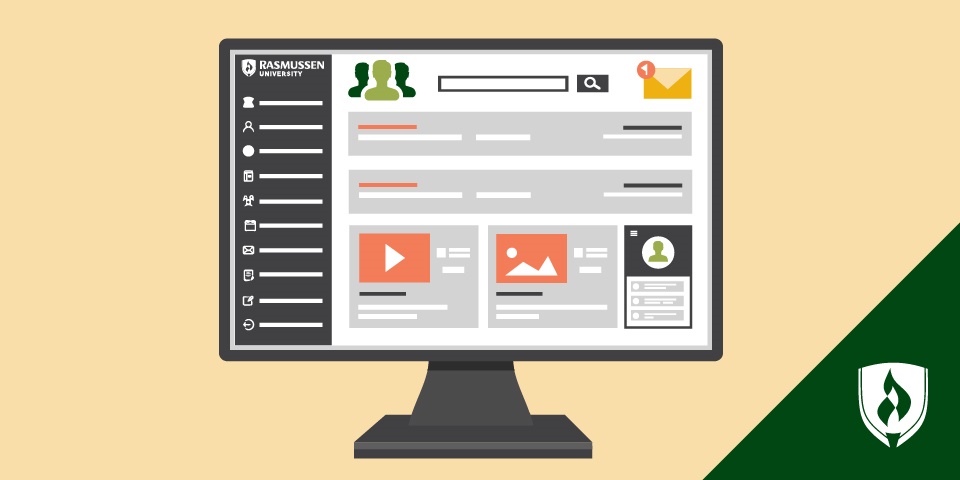
In the last few decades, online courses have made it more convenient for students to earn their degree with a flexible schedule and submit assignments remotely.
This fully-online method works well for students who work, have families, travel and are busy throughout their lives. It's also a more adaptable form of learning than traditional education tends to be. This allows for faster updates to the online offerings when new technologies appear or when there are changes in your industry of study.
Online learning also helps students develop a transferable skillset that they can use after graduation. So much of the workforce today occurs with online communication and platforms. Learning to adjust to digital communication styles is an asset to your future career.
What to expect from online classes
Online classes can be amazing. But like many things, your experience will be better if you prepare. Here are some things to understand about how online classes work before you enroll in a program.
1. Planning and scheduling your time is a MUST
Effective time management is the key to being a successful student in higher education—whether you're online or in person. It’s challenging, in general, trying to balance classes with other responsibilities in life.
But with online education, great time management is even more important since you don't have the hard and fast "appear at this location every MWF" to keep you grounded. Some online programs use a traditional semester schedule, some use a quarter or trimester schedule.
An example of how to plan
Let's say Nancy is a new student enrolled in the Business Management degree program. She is apprehensive because she has not been to school in a very long time and is concerned about whether she can pass her courses and earn her degree online.
After connecting with her advisor and utilizing resources within the Learning Center, she learns that she needs to create a study schedule to help her stay organized.
She finds a planning calendar she likes and maps out her online courses for the entire term. She works Monday through Friday, so she schedules time after work and on weekends for reading, studying and working on assignments.
Nancy feels more at ease now that she can see everything organized in one place. She knows that if she follows her schedule, she should have time for everything she needs to do.
For more ideas on this, check out Organization Tips for College Students: 5 Steps to Get Organized.
2. Research the university's learning management system
Online degree programs all utilize a learning management system (LMS) of some kind. These systems can range wildly in terms of their user experience and quality. Before you enroll in an online program, research the LMS they use and maybe even see what it looks like to navigate. (YouTube® video walkthroughs or online tutorials can be perfect for this).
Here at Rasmussen, we use an LMS called Blackboard®. New student orientation includes a walkthrough of what this platform looks like and how you use it.
The online courses are broken up into modules containing the following:
- Learning Objectives (to understand what you're working toward)
- Assigned Chapter Readings (to digest important information)
- Course Assignments (to practice what you've learned)
- Lesson Content (resources like e-textbooks, links, videos and more)
Many students are surprised when they find out they don't have to purchase a physical textbook. The Rasmussen Business classes have e-textbooks already embedded inside of the course.
The variety of lesson content formats can help learners of many different styles, and the courses often include practice assignments that will help you get used to the format of your quizzes and exams.
3. Take advantage of live session options
When deciding to take online courses, many students worry about missing out on the physical traditional classroom.
How can you learn the concepts without watching your professor cover them like in traditional classes? How can you ask questions to gain a better understating? Will you be able to connect with classmates like you would in a face-to-face course?
It can be a huge advantage to attend the weekly live sessions that are offered at the University. These live sessions are conducted using Microsoft Teams®. The sessions are recorded, so you can watch them even if you can't make the live time. But if you can make space for the live sessions, even just a few—do it.
These live sessions feel much more like a face-to-face class. The instructor teaches a full lesson, covers the assignments and answers questions from students just like in traditional classes.
4. Take advantage of recordings to reinforce information on-the-go
At Rasmussen, the modules include short video lessons you can watch or just listen to while you're washing dishes or commuting to work. You can also watch or listen to recordings from any live sessions you missed.
Use them in the same way you'd listen to an audiobook or a podcast. This helps to reinforce what you learn from the chapter readings. And you might hear classmates ask questions that deepen your understanding.
5. Classes can have different due dates and schedules
Courses in both traditional and online education tend to be organized by what makes most sense for their content. This means each course you are in might have a different weekly schedule. That could get confusing if you aren't prioritizing time management.
On our learning management system at Ras, every course outlines how many assignments, quizzes, exams and discussion posts are due each week.
For instance, one class might have one assignment due each week, and another class might have three assignments due each week.
6. Don't skip around
If you are an independently-motivated person, online classes are pretty appealing. You can see the whole course and work through it in the way you like.
You might also feel like you can handle the modules and courses on your own—working through content as quickly as possible. Since online classes allow you to work ahead or skip to quizzes, some students try to bypass the lectures, video content, live sessions or readings.
But take the time to follow the flow designed for the course. That is how they were made to work.
Here's an example.
When Nancy starts her classes, she is unsure about how the exams and quizzes would work. They are timed, so she plans her calendar accordingly and takes these assessments when she is not distracted and has a good internet connection.
Her instructor advises the online classroom to wait to take the quizzes/exams until after they have completed the module readings and attended the live session. Nancy notices that she performs better on these assignments when she follows the recommendation from the instructor.
7. Be collaborative on the discussion boards
The discussion forums are where students interact with one another and their instructor in an online setting. This is similar to participating in class discussion during a face-to-face class. The discussions expand on the weekly objectives which help students further grasp the course content.
If you treat assignments to comment or share something in the discussion forums as just another assignment box to check off, that's what it will be. But think of discussion boards as an opportunity to connect with other students and build a network.
This is one of the most common benefits of a college education that so many students miss out on. Your network is such a valuable career asset. Start networking right away. Make connections with students in your area—or with students who seem just as invested in their future careers as you are.
You can learn from each other's experiences, and you can build connections that will outlast your program.
8. Pay attention to the grading rubric
You've probably had a wide variety of grading feedback already from middle school or high school. In an online college program, the rubric is totally the key to scoring well.
In Rasmussen's courses, students will have a very detailed grading rubric. When you get assignments back, you will know exactly which areas you did well in and which areas you need to improve. Your instructor may also include written grading feedback.
Pay attention to all of this feedback and allow it to shape your future assignments. (This is another point in favor of working through the material in order). The feedback will help you understand what each instructor is looking for since online college classes work toward student success beyond the classroom.
9. Try a tutoring session early on
It's better to give your online courses 100% of your attention at the beginning, then realize you're doing well and ease up a bit, than to put them on the back-burner, assuming you'll be fine, then realize you're doing poorly and panic.
Assume that you'll be adjusting to a learning curve in your first few weeks and schedule a tutoring session after you get feedback on some of your first assignments. The tutors will use the grading rubric to help you see what the instructor is looking for.
Make sure your online university has tutoring options available as well. This isn't a resource for people who are in serious academic trouble. It's a resource for people who want to thrive. Students are supposed to take advantage of these things.
10. Don't ignore free resources
As an online student, you are not alone! New students often have anxiety about taking courses online because they feel like they have to do everything on their own. Navigating resources from your program can seem overwhelming, but take the time to peruse the options.
Think of them like free amenities at a hotel. They are there for you—you might as well take advantage.
Rasmussen University invests a lot of resources into the Learning Center for our online learners. Some of these are...
- New student mentoring
- Resources for your specific area of study
- Tutoring
- Writing Lab
- Online library
- Career Services
I always tell my students that this is their education—it’s their responsibility to take advantage of every resource that is available to help them be successful.
These resources can also be a great way to gain some work experience through the university, such as becoming a peer tutor. Previous students of mine who became peer tutors were able to utilize their skills to help other students be successful.
11. Don't ignore the "announcements" section
If you've ever been in a traditional college setting, you might remember teachers reminding you when assignments were due and covering basic 'housekeeping' information at the start of each lecture.
Each course has an "Announcements" area that lists important information and reminders throughout the week. This can be very helpful when you're logging into most online classes.
At Rasmussen University, each instructor also lists office hours in the syllabus with their phone number to reach them (and some of the instructors are even okay with text messaging as well.)
Are online classes right for you?
Overall, online classes have a lot of advantages, whether you're an early bird, night owl or everything in between.
Although students are not in a physical classroom, there are many ways to feel empowered and confident at an online college. Do you think you could thrive as an online student? Check out What Makes a Good Online Student? 5 Qualities That Lead to Success for more.
YouTube® is a registered trademark of GOOGLE LLC
Blackboard® is a registered trademark of Blackboard Inc.
Microsoft Teams® is a registered trademark of Microsoft




